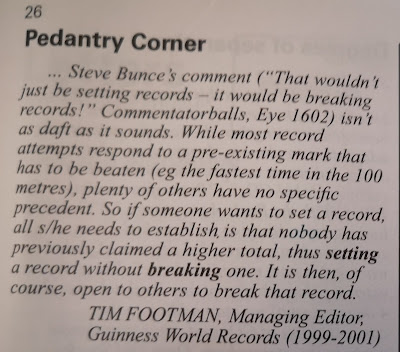This, by one Jash Dholani, has been provoking much derision on Twitter over the past few days.
Wednesday, August 30, 2023
About good art
Sunday, August 27, 2023
About Barbie
I enjoyed the Barbie movie, and was quietly impressed with how it sneaked references to Proust and Kubrick into a big-budget, candy-coloured Hollywood extravaganza. But I think Ian Leslie gets things right:
Rather than advancing intellectual ideas, it uses intellectual-sounding talk as a colour in its tonal palette, a striking and funny contrast to the vacuity of its characters. Barbie tickles the frontal cortex, site of Deep Thoughts, but its purpose is to raid the hypothalamus, source of endorphins.
Tuesday, August 22, 2023
About Thaksin
Thaksin Shinawatra, the former prime minister of Thailand, has returned from his long exile after the monarchy/military nexus that really runs things decided he was the lesser of two evils. If you want some understanding of how we got to this point, for crying out loud don’t read this article that I wrote for The Guardian because the coup that toppled him happened when their regular woman in Bangkok was on holiday. Mini-me suggests:
Provided he [General Sonthi Boonyaratglin, the coup leader] sticks to his word and hands over to a civilian administration within a fortnight, and that administration immediately calls elections where vote-buying can be at least minimised, if not eradicated, a damaging and frustrating period of uncertainty will have ended.
Well, Sonthi did hand over power – to another general. And Thailand’s fragile democracy is still trying trying to piece itself together. Proof, if ever it were needed, that proper, grown-up journalism was never going to be my forte.
Wednesday, August 16, 2023
About TikTok
Every generation is told that its own crazes and foibles are the equivalent of vogueing while the Titanic goes down, and then 40 years later, they see the apocalypse happening live in the actions of their children and grandchildren. So it’s probably just a sign that I’m very, very old that the end of this article by Barrett Swanson resonates so much:
TikTok is a sign of the future, which already feels like a thing of the past. It is the clock counting down our fifteen seconds of fame, the sound the world makes as time is running out.
Saturday, August 12, 2023
Sunday, August 06, 2023
About the middlebrow
You know, I could get behind this...
On the one hand, a supercilious and increasingly anhedonic critical taste. On the other, people who can’t make sense of what they watch or read . Oh no I’m arguing for a return to the golden age of the middlebrow
— Kevin Power (@KevPow3) August 6, 2023
Thursday, August 03, 2023
About University Challenge
Having written a whole bloody dissertation on the subject, I’m all for interrogating the criteria on which questions are chosen for quiz shows. However, James Delingpole’s article about University Challenge in the Spectator jettisons any pretence of objective investigation in favour of snobbery and perhaps worse.
I said when Amol Rajan was announced as the new host that those grumbling about so-called diversity hires should be satisfied that, like his predecessors, Rajan is a Cambridge-educated male. Not good enough for Delingpole, apparently, who sneers that, apart from dropping his “H”s, he went to “insufficiently medieval Downing”; he hints that there were “any number of reasons” that he got the gig but judiciously avoids mentioning them, The Spectator finally having cottoned on that explicit racism is more trouble than it’s worth. Then there’s a bit of knee-jerk transphobia, and a chance for the author to air his preposterous climate change scepticism. So far, so Delingpole.
But then he gets on to the questions themselves and his biggest worry appears to be that there are just too many mentions of people who are, and I can hardly bring myself to say this, female and/or non-white. Again, there’s a valid debate to be had about whether the content of the show should represent what the canon is, or what we might want it to be, but Delingpole has decided already, apparently from a position of blimpish ignorance. Dismissive references to “whatever it was Clara Schumann may have written” say far more about the author than about the question setters or Schumann herself. If Mrs Dalloway is “unreadable”, one has to assume Delingpole hasn’t read it, so the value of his opinion on its worth is negligible at best. And rather than show any curiosity over a book of which he’d never heard (Ralph Ellison’s Invisible Man) he simply assumes because he didn’t know it (and, implicitly, because it’s about black people) it isn’t as good as Dostoevsky. Many books have been written defending the glories of the traditional Western canon, but Delingpole’s argument seems to be that he went to Oxford – and a proper medieval college at that – so he knows best.
Ultimately he falls into the same trap as Nick Fisher did when responding to Derek Malcolm’s list of the greatest movies; he’s confusing his own limited intellectual horizons for good taste. But there’s one more thing that grates. Delingpole defines himself as a libertarian conservative, a supporter of market-based solutions to most of our problems. One of the landscapes that such policies have changed beyond recognition in recent decades is academia, where syllabuses now have to reflect what the customers want to study. And yet when the customers decide they’d rather read Woolf or Ellison than Chaucer or Dostoevsky, and the universities accede, the right-wing media suffers a collective aneurysm. You won, James. Get over it.





